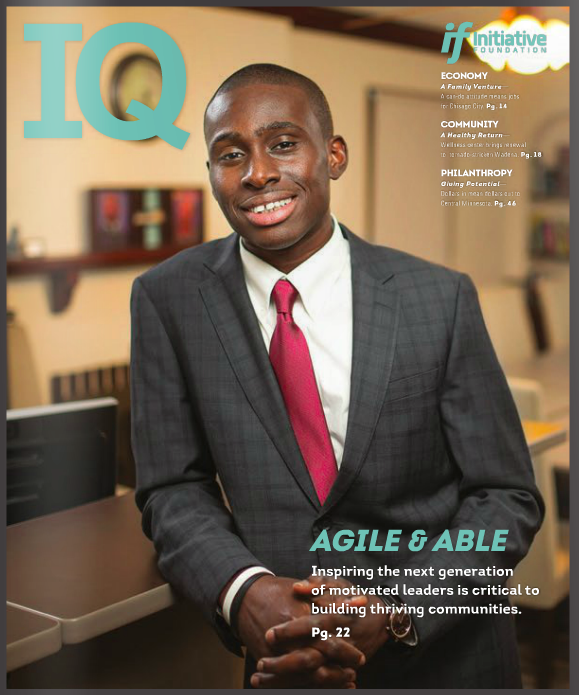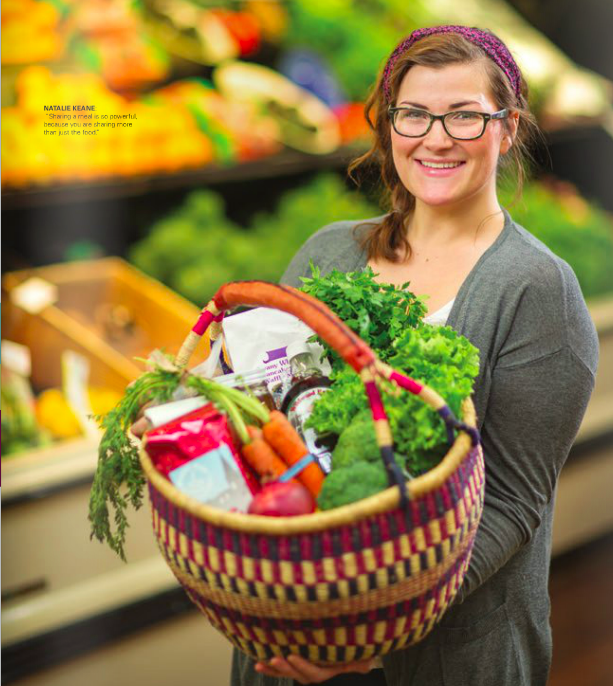Published in the 1st quarter edition of I.Q. Magazine
By Laura Billings Coleman
 What will you need to make your community a better place?
What will you need to make your community a better place?
When Don Hickman, the Initiative Foundation’s vice president for community and economic development, put that question to a gathering of rural leaders a few years ago, he was surprised by the answer he got from an elected official in his 70s.
“What I really need is someone to run against me,” the man told the group. “I want to retire, but I don’t see anyone standing up to take my place.’”
Replacing the more than 10,000 baby boomers retiring every day in the United States from long careers and community leadership roles will be critical work for the small towns and rural communities of Greater Minnesota. Compared to the Twin Cities, where one in 56 people will be tapped to take on a leadership role, the average rural Minnesotan has responsibility for six or more top jobs, according to University of Minnesota Extension rural sociologist Ben Winchester—roles that can range from running small businesses to serving on community and nonprofit boards and supporting the leadership of area churches and schools.
Which means it’s crucial for our communities to tap the talents and passions of established leaders and those who might not yet think of themselves as leaders. “We need to plan ahead about how to help pass the baton and encourage that next generation of leaders to step up,” said Hickman. “It’s important to build these connections because not only do these traditional leaders have a lot of wisdom to share, the new leaders we’re seeing in that 18- to 35-year-old demographic reflect the diversity that’s helping to grow the region, combined oftentimes with a deep sense of purpose and community service.”
What makes a Leader?
“The most effective emerging leader is someone who is solution-focused as opposed to problem-focused,” said the Initiative Foundation’s Chris Fastner, senior program manager for organizational development who works closely with younger leaders who are serving regional nonprofits through the Americorps Volunteers In Service To America (VISTA) program. “I’ve seen it again and again in our work with VISTA that there are some people who bump into hurdles and get stuck. And there are other people who encounter hurdles and go right over them.”
To harness their potential, the Initiative Foundation is creating an Emerging Leaders program. Funded by a $200,000 Leadership Network Grant from the Bush Foundation, the initiative is designed to increase the skills, abilities and agility of next generation leaders and build connections between generations, cultures and the communities where they’ll live and work.
Here are three emerging leaders who can help us all better understand what it takes to make a difference in Central Minnesota. We guarantee you’ll be hearing more about them in the years to come.

EMMANUEL OPPONG
As a psychology student in his native Ghana, Emmanuel Oppong was troubled by the stigma faced by people suffering from mental illness. “In my culture, you’re either ‘crazy’ or you’re ‘normal,’ and there’s not much middle ground in between,” said Oppong, who started his graduate studies at St. Cloud State University in 2010 at the urging of his sister Eunice Adjei-Bosompem, also a graduate of SCSU.
“Only I forgot to ask her about the weather, so I found out the hard way,” said Oppong, 30. “The first winter was so brutal, I asked myself every day what I was doing in Minnesota.” It wasn’t just the harsh climate that made Oppong feel left out in the cold. “I grew up in a collectivist culture, where the whole group is emphasized, and your uncles and your aunties and your neighbors are like parents to you,” he said. “In American culture, it’s about independent living, and I struggled at first without a support network.”
Though he spoke British English, Oppong had trouble understanding American idioms and the expectations of his professors. After a tough first semester, he contemplated giving up and going home, but his sister encouraged him to stay and get involved in the community—a move that made all the difference. “I decided I couldn’t be an average student concerned about academics only,” he said. “When I graduated, I wanted to show that I had made myself known and developed my skills professionally.”
Oppong committed himself to community service, earning the President’s Student Leadership Award for his work mentoring youth at the YMCA, serving on SCSU’s student government, getting involved with social justice causes such as the Community Anti-Racism Education Initiative and volunteering his time with nonprofits such as Books to Africa and Talent Emergence International, a nonprofit that works with former child soldiers. To earn his clinical therapy license, Oppong also interned at the Minnesota Correctional Facility in St. Cloud, working with incarcerated clients and their families.
“Emmanuel is one of those people who took the opportunity of being in another land, and said, ‘How can I learn something and give something back at the same time?’” said Dr. Manijeh Daneshpour, a professor of marriage and family therapy at SCSU, who now supervises Oppong’s clinical therapy work at Recover Health Resources, where they work with many immigrants and refugees from east Africa. As an international student, he saw the challenges these new arrivals often face and seized the opportunity to help, she said. “He saw that people were very much misunderstood, and so he took that upon himself to educate and become engaged in the conversation in his community.”
With plans to pursue his doctoral degree in psychology, Oppong says his community service in St. Cloud reinforced the lessons he first learned playing soccer. “In this game all the players have a single goal, and that is to score, yet this cannot be achieved with just one player,” he said. “One has to learn to form deep relationships through partnership and collaboration with diverse individuals to achieve a goal.”
NATALIE KEANE
A College of Saint Benedict philosophy and pre-med graduate, Natalie Keane had been considering a career in medicine until a year as a VISTA volunteer showed her there are other ways she could help make communities healthier. “There’s something about sitting at a table over a cup of coffee or a plate of food that can bring down the barriers between people,” she said.
That was one of the first discoveries Keane, 24, made last year as she worked with her alma mater to launch CSB’s Community Kitchen, a project that shares surplus campus food throughout the community. The idea for the program was hatched six years ago, when a group of nutrition students began exploring whether there was a way to fill in some of the estimated 100 million meals missed by Minnesotans in food poverty with the college’s cafeteria food that would otherwise go to waste. Keane launched the program’s first pilot partnership with families involved in Reach Up, Inc., and soon found that giving them a chance to sit down and share a meal together proved even more popular than the original plan to pack up individual meals to take home.
“Sharing a meal is so powerful, because you’re sharing more than just the food,” Keane said about Community Kitchen partnerships that now bring St. Ben’s students and girls at Casa Guadalupe Multicultural Community in Cold Spring together for an afterschool program that combines food and fellowship, and others that connect college tutors with English language learners. “Connecting the campus to the wider community is one of the goals of the program, and food is just a great way to make that happen,” she said.
“Natalie is one of those young leaders who sets the bar high,” said the Initiative Foundation’s Chris Fastner, who supervised Keane’s work as part of the VISTA program. “She has no fear about getting into conversations with people she doesn’t know and her curiosity is genuine. She’s really good at connecting the dots and figuring out ways to get lots of people to the table, which are great qualities in a leader.”
With her VISTA year complete, Keane signed on to learn more about sustainably grown food with an internship with the Central Minnesota Sustainability Project’s Market Garden Apprenticeship program. Now she’s the assistant manager of the Minnesota Street Market, a food and art co-op in St. Joseph. It’s a job that’s helping to feed her growing curiosity about how communities can create more sustainable food systems. “Community Kitchen instilled in me this need to learn more about every aspect of the food system,’’ said Keane. “Now that my eyes are open to the possibility of creating richer communities by coming together around food, I have a huge passion for this work.”

NORMA OROZCO
With a 4-year-old daughter and a full-time job, Norma Orozco, 26, doesn’t have a lot of extra time in her day. But when she was approached to serve on the parish council of St. Mary of Mount Carmel, becoming the first member of Long Prairie’s growing Hispanic community to break the cultural barrier, she knew she had to say yes.
“I feel too young to be a leader, but when people come to me and ask for help, I never say no,” said Orozco, whose family was among the first wave of new immigrants from Mexico to arrive in Todd County more than a decade ago.
Though she spoke no English when she entered school in sixth grade, it took less than a year for her to earn “Student of the Week” recognition from her reading teacher, who was astonished by her progress. “I learned fast because I had to,” Orozco said.
Tim King, the founder of Long Prairie’s bilingual La Voz Libre newspaper, says Orozco has been a quick study from the start, challenging herself by taking college-level physics as a high school student, and becoming the first Hispanic professional in the community, serving the Spanish-speaking community at Advantage 1 Insurance. “She’s a serious young woman with a keen sense of obligation about her role in the Hispanic community,” said King. “She has impressed people so substantially that she’s been able to break through a lot of barriers.”
Orozco acknowledges that the influx of new immigrants in Todd County has caused growing pains in Long Prairie. “I don’t think the young people have a problem with it, but it’s harder for the older community,” she said. That’s why she encourages other young leaders in her community to follow her lead, and get involved in the larger community by volunteering to help out at church functions, school fundraisers and other community events. “It’s good to get out in the community, because people get to know who you are, and they find out what you’re good at, and how you can help. I think that’s how you become a leader.”


hi, Laura and Nick,
this was a great story. so interesting to know what is going on outstate, since so much of the Strib is focused on the Twin Cities. I am currently working as a p.r. volunteer with a new nonprofit call UpTurnships. they are working with a class of 22 collegians. The students work at an internship Monday-Thursday, then on Fridays meet with counselors who are mentoring them on problem solving, public speaking, time management and more. some terrific young minority men and women in the group. I am happy to use my media skills for this good cause.